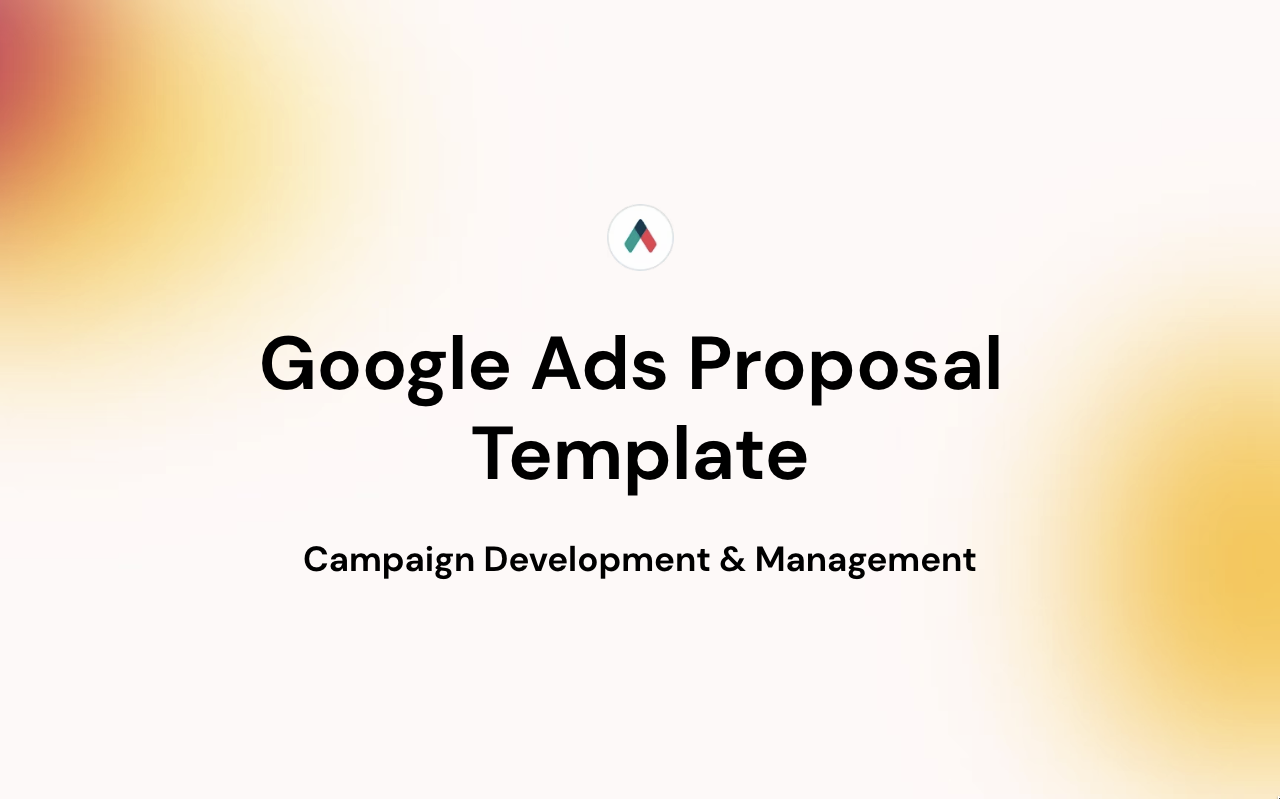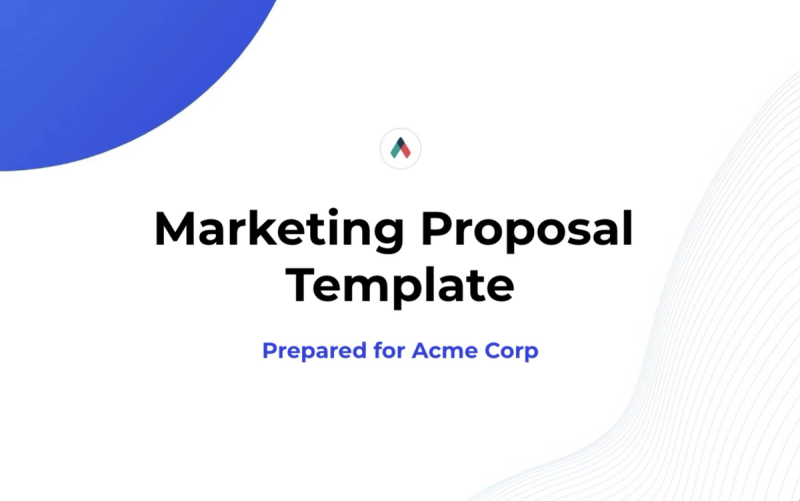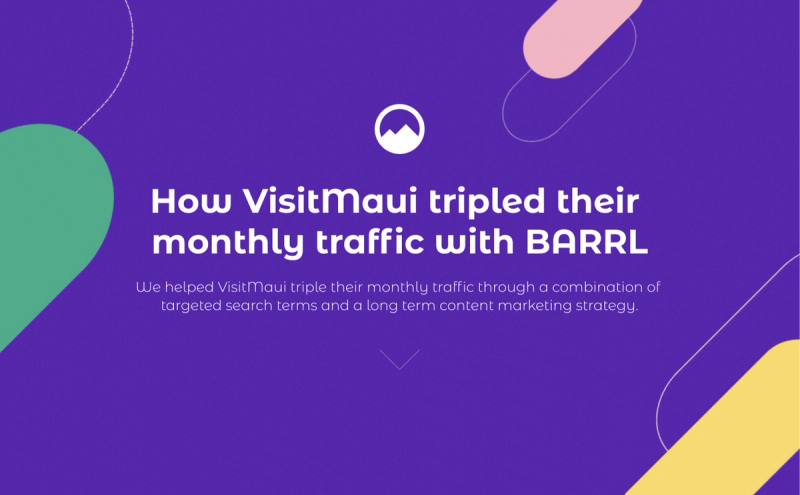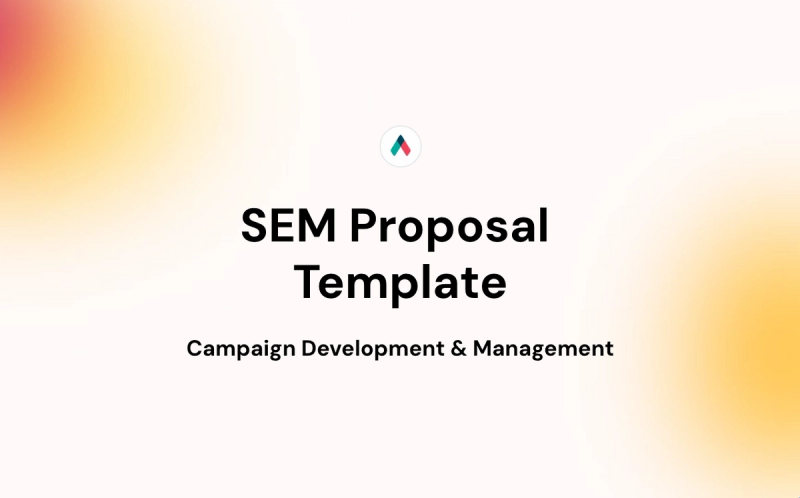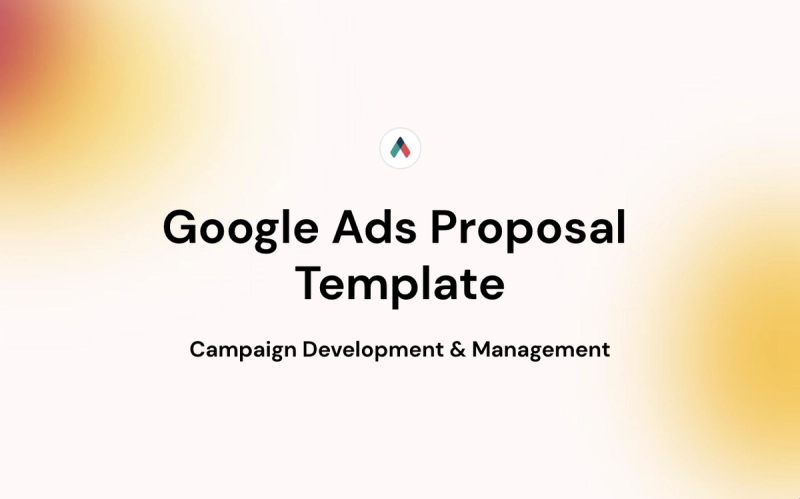PPC Proposal Template
Craft a winning PPC strategy with the comprehensive PPC Proposal Template – efficiently develop targeted and result-oriented campaigns.
About this template
Impress potential clients with our visually engaging and comprehensive PPC Proposal Template. Designed to highlight your expertise in pay-per-click advertising, this template showcases your strategies, services, and success stories.
Leverage our user-friendly template to demonstrate your understanding of clients' needs and deliver customized solutions that set your agency apart. Win more PPC projects and grow your business by using our professionally crafted PPC Proposal Template and Google Ads Proposal Template
What's included?
- Background
- Objectives
- Keyword research
- Ad copy creation
- Campaign set up and management
- Campaign reporting
- Quote
- Our work
- Our team
About the author

Brendan Connaughton|Head of Growth Marketing
Brendan heads up growth marketing and demand generation at Qwilr, overseeing performance marketing, SEO, and lifecycle initiatives. Brendan has been instrumental in developing go-to-market functions for a number of high-growth startups and challenger brands.
A PPC proposal is a document that outlines a digital marketing agency's proposed strategy for managing a client's pay-per-click (PPC) advertising campaigns. It typically includes an overview of the client's business goals, a comprehensive analysis of the current PPC landscape, and a detailed plan for improving campaign performance and return on ad spend (ROAS).
When creating a PPC proposal, the agency will first conduct a thorough analysis of the client's business and target audience. This includes researching the client's industry, competitors, and target keywords. The agency will then use this information to create a customized PPC strategy that is tailored to the client's specific needs and goals.
The PPC proposal will typically include a breakdown of the proposed budget, including how much will be allocated to each campaign and ad group. The proposal will also outline the proposed bidding strategy, including which keywords will be targeted and how much the agency plans to bid on each keyword.
The proposal should also include details on how the agency plans to measure and track campaign performance. This may include setting up conversion tracking, creating custom reports, and analyzing data to make informed decisions about campaign optimization with the assistance of a proposal management system.
A PPC proposal is valuable in various situations to effectively communicate your PPC services and win new clients. Here are some scenarios in which a PPC proposal can be highly beneficial:
- Pitching to Potential Clients: When presenting your PPC services to potential clients who are interested in implementing PPC advertising but need guidance, a well-structured proposal can outline your approach and provide a clear roadmap. It demonstrates your expertise, helping clients understand the potential benefits of PPC and why they should choose your agency.
- Revitalizing Underperforming PPC Campaigns: If a potential client has previously attempted PPC advertising but did not achieve the desired results, your proposal can showcase your ability to identify and address the reasons for underperformance. You can highlight your strategic approach and propose optimizations to improve campaign effectiveness, winning their confidence and securing their trust.
- Responding to RFPs (Request for Proposals): When clients issue an RFP for PPC services, a comprehensive proposal is crucial. It allows you to respond to the specific requirements outlined in the RFP, highlighting your capabilities, experience, and unique selling points. A well-crafted proposal increases your chances of being shortlisted for consideration.
- Competitive Bidding Scenarios: In situations where multiple agencies are vying for the same PPC project, a compelling proposal can give you a competitive edge. By showcasing your expertise, tailored approach, and successful case studies, you can differentiate yourself and convince potential clients that you are the ideal partner for their PPC needs.
- Initial Client Meetings: A PPC proposal can be used as a supporting document during initial client meetings. While discussing your services, you can provide the proposal as a tangible representation of your strategy and capabilities. It helps potential clients visualize your proposed solutions and makes a lasting impression.
Learn how to write a PPC proposal by reading our comprehensive guide.
- Easy Customization: The template offers a user-friendly interface and drag-and-drop editor, making it easy to customize according to your client's specific requirements. You can add, remove, or rearrange sections effortlessly, personalize colors and fonts, and incorporate images and videos to create a tailored proposal.
- Professional-Looking Templates: Qwilr provides a range of pre-designed templates that are visually appealing and designed to impress potential clients. The templates have clear headings and sections, ensuring that your proposal is well-structured and easy for clients to understand.
- Increased Efficiency: The template offers a framework that saves you time by streamlining the proposal creation process. It allows you to focus on crafting persuasive content and delivering a compelling message to potential clients.
- Improved Client Experience: Clients can view and engage with the proposal online, leaving comments and asking questions directly within the document. This streamlined communication process enables you to address their concerns promptly and provide necessary clarifications.
- Seamless Collaboration: You can invite team members to contribute and fine-tune the proposal in real-time, ensuring a comprehensive and cohesive final document. Collaborative editing and feedback streamline the review process and foster stronger teamwork.
- Integrated Analytics: You can track how clients interact with the document, such as the time spent on each section and the frequency of views. These analytics help you understand client interests and tailor your follow-up communication effectively.
Here's a quick video overview of how to get started with this template:
- Sign up for a free 14-day Qwilr trial.
- Browse the available templates and select the PPC Proposal Template. You can preview each template to see its layout and design.
- Once you've chosen the template, click on it to start customizing. Qwilr's intuitive drag-and-drop editor allows you to make changes easily.
- Customize the template to match your branding. Upload your company logo and adjust the color scheme to reflect your brand's colors.
- Begin editing the sections of the template. Start with the proposed PPC strategy section, where you outline your approach, target audience, keywords, ad copy, and landing pages. Tailor the content to your client's specific needs and goals.
- Move on to the expertise and achievements section. Highlight your experience, successful campaigns, industry recognition, and any relevant certifications or awards. Provide compelling evidence of your expertise in PPC marketing.
- Proceed to the pricing and payment plans section. Clearly outline the costs associated with the PPC campaign, including management fees and ad spend. Specify the payment schedule and any discounts or special offers.
- Review your customized PPC proposal to ensure it is accurate, well-structured, and visually appealing. Make any necessary adjustments to the content, formatting, or design.
- Save and publish your PPC proposal as a Qwilr page. This creates a web-based version that you can easily share with your client.
- Share the proposal with your client via a unique URL or by sending them an email invitation through Qwilr. Clients can view, interact with, and provide comments on the proposal directly on the Qwilr page.
- Monitor client engagement using Qwilr's built-in analytics. Track how clients interact with the proposal, such as the time spent on each section and whether they have viewed or shared it with others.
A tool packed with features
Brand control
Establish your brand settings once and automatically apply to every piece of collateral.
Payments
Collect payments instantly from customers with Stripe or direct to your own payment system.
Security & GDPR
Add security features like password protection and link expiry to protect sensitive content.
Embedded content
Add Calendly links, videos, surveys, Looms, GIFs and more to every page.
E-signature
Get deals signed on the spot with built-in e-signing ability.
Asset library
Create a library of reusable content for sales reps.
ROI calculator
Showcase your value with an interactive ROI calculator embedded in your Qwilr pages.
Team management
Set up permissions so your team accesses only what they need.
Interactive pricing
Empower buyers with interactive pricing plans and quotes.
Templates for every use case
Explore templates for sales, marketing, customer success, sales enablement and more.
Explore proposal templatesFrequently asked questions
When writing a PPC proposal, it's important to keep a few key things in mind. Firstly, make sure you understand your client's business goals and how PPC can help achieve them. Secondly, analyze the client's current PPC campaigns and identify areas for improvement. And thirdly, outline a detailed plan for optimizing campaign performance, tracking success, and reporting results back to the client.
Creating your own PPC proposal with Qwilr is a simple and straightforward process. Once you've signed up for an account, select the PPC Proposal Template that best suits your needs and start customizing it to your liking. Be sure to include details on your proposed PPC strategy, your agency's experience and expertise, and your pricing and payment plans.
A winning PPC proposal should include several key components. Firstly, a thorough analysis of the client's current PPC campaigns and how they can be improved. Secondly, a detailed plan for PPC campaign management, including strategies for keyword research, ad copywriting, and budget allocation. And thirdly, a clear pricing and payment plan that outlines costs and deliverables.
The key components of a PPC proposal include a comprehensive analysis of the client's current PPC campaigns, a detailed plan for PPC campaign management and optimization, and a clear pricing and payment plan. Additionally, you may also want to include case studies or client testimonials to demonstrate your proven success in PPC campaign management.
